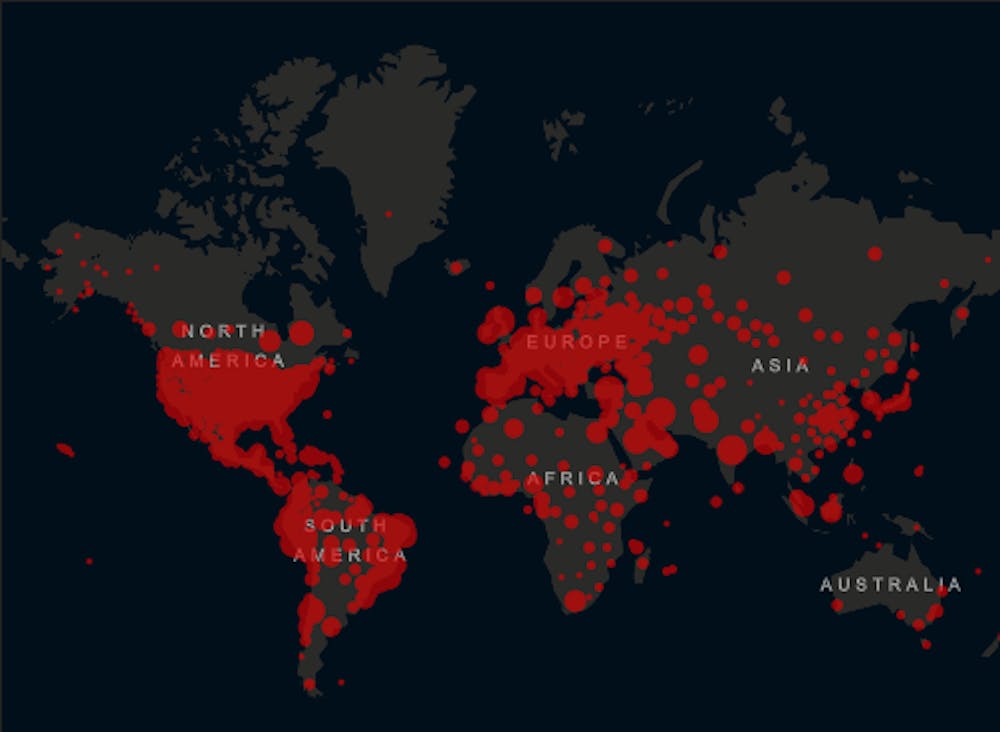In late January, Hopkins launched its COVID-19 Dashboard, a project created by Civil and Systems Engineering professor Lauren Gardner and her graduate student, Ensheng Dong. This tool allows the public to visualize and track the spread of COVID-19.
In March, this dashboard expanded to include the Coronavirus Resource Center (CRC), a website that aims to provide government officials, researchers and the general public with information about the number of COVID-19 cases, contact tracing, testing and vaccine efforts.
In mid-October, the CRC was recognized as “2020’s Go-To Data Source” and earned a place under the Wellness category in Time’s “The Best Inventions of 2020,” a list that recognizes 100 products and services that were made to address some of the world’s toughest problems.
The CRC is maintained 24/7 and updated daily. It is supported through the interdisciplinary efforts of all academic divisions at Hopkins, including the Centers for Civic Impact and the Applied Physics Laboratory.
Lainie Rutkow, a professor of Health Policy and Management at the School of Public Health, commented on the achievement in an email to The News-Letter.
“We are a diverse, women-led team, and many of us have been working tirelessly behind the scenes for months,” she wrote. “Being named to Time's 100 Best Inventions list is a great validation of our collective efforts, but we know there is still much more to be done, as the pandemic surges to new heights every day.”
Through the efforts of people from multiple sectors of the University, including researchers, software engineers and developers, the website has been viewed almost one billion times since its launch.
Since the website is an ongoing project, most of the team found out about the news while in meetings for the project. They shared their surprise and gratitude when they first heard about it.
“We were thrilled to learn that our interdisciplinary team’s efforts to share accurate information and expert analysis have been recognized in this way,” Rutkow wrote. “Coming just before Thanksgiving, it did allow us to reflect on how grateful we are for the support we’ve received from the University to do this work every day.”
Beth Blauer, executive director of the Centers for Civic Impact, explained in an email to The News-Letter that the team is incredibly proud of their work, not only because it recognized the combined efforts of many but also because it is a testament to the important role of data analysis in public health policies.
“For those of us who have worked in public data for our entire careers, it was a truly remarkable sign of how this pandemic has changed the way the public uses and relies on data,” she wrote.
The website collects information from more than 300 data sources, including the World Health Organization, the U.S. Centers for Disease Control and Prevention, the European Centre for Disease Prevention and Control, the National Health Commission of the People’s Republic of China and each state’s Department of Health.
“It was really important that this kind of tool designed to support evidence-based decision-making and policy-making was validated in such a prominent way,” Blauer wrote.
While recognition as one of the best inventions this year is certainly a cause for celebration, the continual rise of COVID-19 cases encourages the team to work even harder on the project. The team believes that the primary way to acknowledge the accomplishment is to continue working.
“This public health crisis grows more serious by the day, so we feel that the best way to acknowledge this honor is to continue the CRC’s work of democratizing COVID-19 data and developing tools that can help keep the public safe,” Blauer wrote.
As the team continues to work on the CRC, collaborating with specialists from various fields to make a tool that combats this health crisis, Rutkow reflected on the University’s mission.
“All of us who work on the Coronavirus Resource Center feel incredibly privileged to be truly living the University's mission every day: ‘Knowledge for the World,‘" Rutkow wrote.





